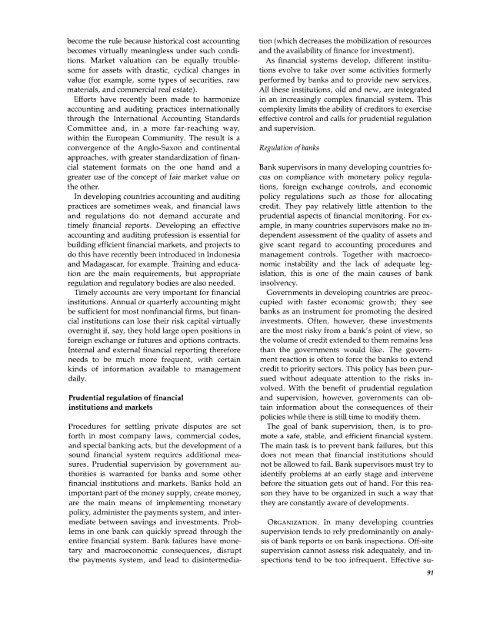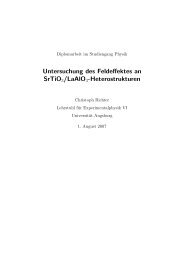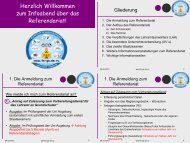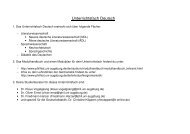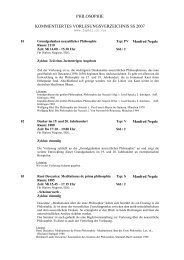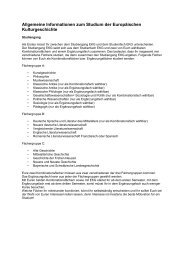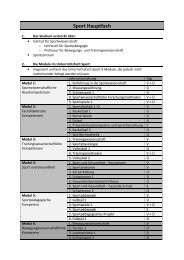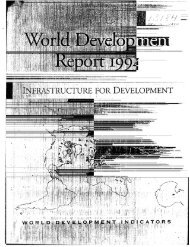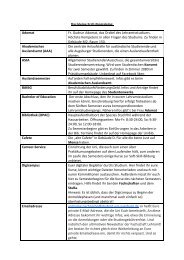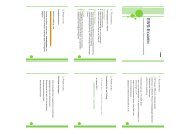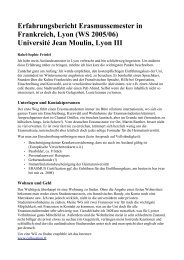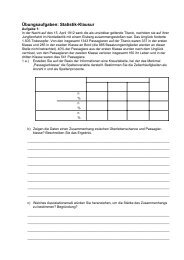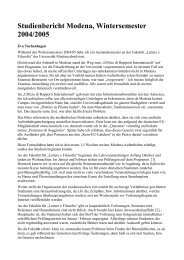Financial systems and development
Financial systems and development
Financial systems and development
You also want an ePaper? Increase the reach of your titles
YUMPU automatically turns print PDFs into web optimized ePapers that Google loves.
ecome the rule because historical cost accounting tion (which decreases the mobilization of resources<br />
becomes virtually meaningless under such condi- <strong>and</strong> the availability of finance for investment).<br />
tions. Market valuation can be equally trouble- As financial <strong>systems</strong> develop, different institusome<br />
for assets with drastic, cyclical changes in tions evolve to take over some activities formerly<br />
value (for example, some types of securities, raw performed by banks <strong>and</strong> to provide new services.<br />
materials, <strong>and</strong> commercial real estate).<br />
All these institutions, old <strong>and</strong> new, are integrated<br />
Efforts have recently been made to harmonize in an increasingly complex financial system. This<br />
accounting <strong>and</strong> auditing practices internationally complexity limits the ability of creditors to exercise<br />
through the International Accounting St<strong>and</strong>ards effective control <strong>and</strong> calls for prudential regulation<br />
Committee <strong>and</strong>, in a more far-reaching way, <strong>and</strong> supervision.<br />
within the European Community. The result is a<br />
convergence of the Anglo-Saxon <strong>and</strong> continental Regulation of banks<br />
approaches, with greater st<strong>and</strong>ardization of financial<br />
statement formats on the one h<strong>and</strong> <strong>and</strong> a Bank supervisors in many developing countries fogreater<br />
use of the concept of fair market value on cus on compliance with monetary policy regulathe<br />
other.<br />
tions, foreign exchange controls, <strong>and</strong> economic<br />
In developing countries accounting <strong>and</strong> auditing policy regulations such as those for allocating<br />
practices are sometimes weak, <strong>and</strong> financial laws credit. They pay relatively little attention to the<br />
<strong>and</strong> regulations do not dem<strong>and</strong> accurate <strong>and</strong> prudential aspects of financial monitoring. For extimely<br />
financial reports. Developing an effective ample, in many countries supervisors make no inaccounting<br />
<strong>and</strong> auditing profession is essential for dependent assessment of the quality of assets <strong>and</strong><br />
building efficient financial markets, <strong>and</strong> projects to give scant regard to accounting procedures <strong>and</strong><br />
do this have recently been introduced in Indonesia management controls. Together with macroeco<strong>and</strong><br />
Madagascar, for example. Training <strong>and</strong> educa- nomic instability <strong>and</strong> the lack of adequate legtion<br />
are the main requirements, but appropriate islation, this is one of the main causes of bank<br />
regulation <strong>and</strong> regulatory bodies are also needed. insolvency.<br />
Timely accounts are very important for financial Governments in developing countries are preocinstitutions.<br />
Annual or quarterly accounting might cupied with faster economic growth; they see<br />
be sufficient for most nonfinancial firms, but finan- banks as an instrument for promoting the desired<br />
cial institutions can lose their risk capital virtually investments, Often, however, these investments<br />
overnight if, say, they hold large open positions in are the most risky from a bank's point of view, so<br />
foreign exchange or futures <strong>and</strong> options contracts. the volume of credit extended to them remains less<br />
Internal <strong>and</strong> external financial reporting therefore than the governments would like. The governneeds<br />
to be much more frequent, with certain ment reaction is often to force the banks to extend<br />
kinds of information available to management credit to priority sectors. This policy has been purdaily.<br />
sued without adequate attention to the risks involved.<br />
With the benefit of prudential regulation<br />
Prudential regulation of financial<br />
<strong>and</strong> supervision, however, governments can obinstitutions<br />
<strong>and</strong> markets<br />
tain information about the consequences of their<br />
policies while there is still time to modify them.<br />
Procedures for settling private disputes are set The goal of bank supervision, then, is to proforth<br />
in most company laws, commercial codes, mote a safe, stable, <strong>and</strong> efficient financial system.<br />
<strong>and</strong> special banking acts, but the <strong>development</strong> of a The main task is to prevent bank failures, but this<br />
sound financial system requires additional mea- does not mean that financial institutions should<br />
sures. Prudential supervision by government au- not be allowed to fail. Bank supervisors must try to<br />
thorities is warranted for banks <strong>and</strong> some other identify problems at an early stage <strong>and</strong> intervene<br />
financial institutions <strong>and</strong> markets. Banks hold an before the situation gets out of h<strong>and</strong>. For this reaimportant<br />
part of the money supply, create money, son they have to be organized in such a way that<br />
are the main means of implementing monetary they are constantly aware of <strong>development</strong>s.<br />
policy, administer the payments system, <strong>and</strong> intermediate<br />
between savings <strong>and</strong> investments. Prob- ORGANIZATION. In many developing countries<br />
lems in one bank can quickly spread through the supervision tends to rely predominantly on analyentire<br />
financial system. Bank failures have mone- sis of bank reports or on bank inspections. Off-site<br />
tary <strong>and</strong> macroeconomic consequences, disrupt supervision cannot assess risk adequately, <strong>and</strong> inthe<br />
payments system, <strong>and</strong> lead to disintermedia- spections tend to be too infrequent. Effective su-<br />
91


